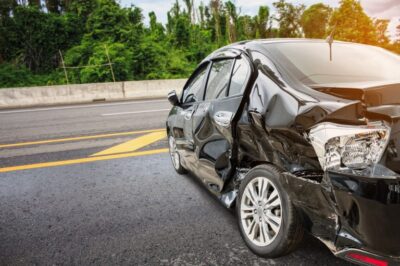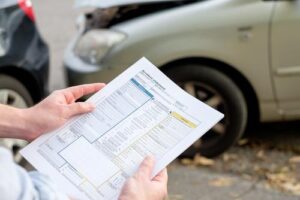
A car accident can leave you with many different emotions. You might feel shocked, angry, or stressed about the future. But many accident victims also suffer from PTSD. Unfortunately, many insurance companies like to downplay mental anguish such as PTSD to avoid paying the maximum amount of compensation car accident victims deserve.
The truth is that PTSD is very common after car accidents, and you shouldn’t let an insurance company invalidate your mental disorder. When you file a claim, you should always factor in PTSD as a part of the damage you sustained.
Understanding PTSD
PTSD stands for post-traumatic stress disorder. According to the National Institute of Mental Health (NIMH), PTSD is a mental disorder. People can develop PTSD after a scary, dangerous, or shocking life event.
Fear and other intense emotions are natural after any type of trauma. However, those with PTSD continue to feel stress and fear long after the event. PTSD can take months or years to develop. However, it can become severe enough to affect work and personal relationships, so even after healing physically, the impact of a car accident can still last for a long time, sometimes permanently.
Get the strong arm
How PTSD and Car Accidents Are Related
When examining the facts and statistics on highway safety, you’ll see that car accidents frequently happen throughout the country. Many car accidents are mild and don’t result in significant injuries, but plenty are severe and can cause considerable injuries requiring hospitalization and treatment.
These severe car accidents are often sudden and violent, often two of the components needed to cause lasting psychological trauma. After encountering a near-death experience that has profoundly affected you physically, developing PTSD isn’t rare. In fact, it’s prevalent for a lot of car accident victims.
Signs of PTSD After a Car Accident
PTSD after a car accident begins to affect everyday life. It’s not just feeling stressed or scared after the crash. Your thoughts and actions start to change.
Common feelings related to PTSD include:
- Anxiety about driving or getting into cars
- Chronic feelings of uneasiness
- Extreme anger, worry, or annoyance
- Sleeping issues or nightmares
- Feeling disconnected from other people or life
- Fearing medical procedures or routine tests
- Uncontrollable flashbacks from the car accident
There are four main types of PTSD symptoms. Doctors will look at each set of symptoms to diagnose PTSD. Someone with PTSD will have one or more symptoms from each group for at least a month.
Re-Experiencing Symptoms
Thoughts and feelings can cause someone to re-experience a car accident. Situations, words, and objects can also trigger symptoms, impacting everyday living.
Re-experiencing symptoms include:
- Flashbacks to the trauma of the car accident
- Scary thoughts
- Bad dreams
- Avoidance Symptoms
Someone with PTSD might change their daily routine because of avoidance symptoms.
Avoiding Feelings or Thoughts Related to the Accident
Stay away from objects, areas, or events that make them think about the accident. While this may sound simplistic, avoiding things that trigger the feeling of a car accident, no matter how slight, can be detrimental when going through everyday life.
Arousal and Reactivity Symptoms
Arousal or reactivity symptoms include:
- Feeling tense
- Startling easily
- Having angry outbursts
- Not being able to sleep
Someone might feel constantly aroused by emotions. Intense emotions can affect sleep, concentration, and daily tasks.
Cognition and Mood Symptoms
A person with PTSD might feel disconnected from other people. They can experience negative moods and thoughts. These symptoms can worsen after the accident. Examples of cognition and mood symptoms include:
- Thinking negatively about themselves or the world
- Losing interest in things they used to enjoy
- Trouble remembering essential details of the accident
- Feeling irrational blame or guilt
Anyone could have the above signs after a car accident. However, symptoms that last more than a month could be PTSD. If you think you could have PTSD, talk to a mental health professional.
The symptoms must also be from the accident. They are not from illness, substance abuse, or something other than the collision. However, someone with PTSD can have other disorders or struggle with substance abuse.
PTSD Car Accident Risk Factors
The following could make someone more prone to PTSD after an accident:
- Having another mental disorder like anxiety or depression
- A history of another traumatic event
- If the car accident was life-threatening
- If someone else was injured or died in the accident
- Being a first responder
- Lack of support after the accident
Even if you do everything in your power to mitigate these risks, it can still be difficult to avoid suffering from PTSD.
PTSD Can Last a Long Time
Many people recover from PTSD within six months. But for some, it can take a lot longer. Chronic PTSD can impact someone’s life for years.
Treatments for PTSD include:
- Talk therapy
- Medication
- A combination of therapy and medication
Everyone is different. Your treatment will depend on your situation. Talk to your mental health provider, as they will know what’s best. You might need to try different treatments to find what works for you.
You Can Receive Financial Compensation for PTSD
If you have PTSD after a car accident, you could be entitled to compensation. It will depend on who was at fault. If another party caused your accident, they are responsible for your injury damages. You can file a personal injury claim with their insurance company. Never find yourself paying out of pocket for any of the damages related to your car accident.
Emotional Damages from a Car Accident
To have a valid claim, you must have a physical injury. If you have physical injuries, you can also claim “emotional injuries.” These are non-economic damages like PTSD, pain, and suffering.
Your compensation will depend on your damages. Damages are the costs or losses from the accident. If the accident caused your PTSD, you could claim the following:
- Medication expenses for PTSD
- Counseling costs
- Inpatient care
- Mental health therapies
Your claim can also include lost wages, vehicle repairs, and medical costs for other injuries. Talk to an experienced lawyer today to know your options. PTSD is not a visible injury like physical wounds. However, it is every bit as real. You deserve compensation for how the disorder has impacted your life. If someone else caused your car accident, it’s essential to know your rights.
Don’t Let Insurance Companies Cheat You
Never let the insurance company cheat you out of a fair settlement. Because mental disorders such as PTSD typically get downplayed, there’s a high chance that the insurance company will claim you’re “overreacting” to the severity of your car accident. You shouldn’t get paid less for psychological damages just because they’re not as apparent as physical injuries.
It’s essential that you get the help of an experienced and dedicated car accident lawyer. Hiring a lawyer is often enough to get the insurance companies to listen to your demands and negotiate for a settlement that covers all of your damages.
Even if you believe you can fight for your claim alone, doing so will be extremely difficult. Focus on recovering from your car accident and overcoming your mental anguish instead of prioritizing financial compensation. Allow the lawyers here at John Foy & Associates to handle all of the legal work for you and win you the settlement you deserve.
Talk to a Car Accident Lawyer for Free Today
If you have PTSD from a car accident, John Foy & Associates can help. We have been helping car accident victims for over 20 years. We know how to build a strong insurance claim for your compensation.
Our lawyers do not charge a fee unless we win your case. You can get legal help immediately without upfront costs. That means you don’t pay unless we win you money. To schedule an appointment for a free, no-risk consultation, please call or contact us online.
404-400-4000 or complete a Free Case Evaluation form





